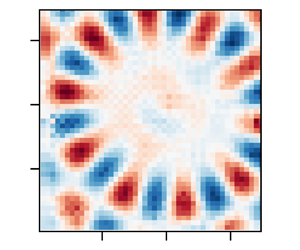Article contents
The spatial structure of electrostatically forced Faraday waves
Published online by Cambridge University Press: 23 March 2022
Abstract

The instability of the interface between a dielectric and a conducting liquid, excited by a spatially homogeneous interface-normal time-periodic electric field, is studied based on experiments and theory. Special attention is paid to the spatial structure of the excited Faraday waves. The dominant modes of the instability are extracted using high-speed imaging in combination with an algorithm evaluating light refraction at the liquid–liquid interface. The influence of the liquid viscosities on the critical voltage corresponding to the onset of instability and on the dominant wavelength is studied. Overall, good agreement with theoretical predictions that are based on viscous fluids in an infinite domain is demonstrated. Depending on the relative influence of the domain boundary, the patterns exhibit either discrete modes corresponding to surface harmonics or boundary-independent patterns. The agreement between experiments and theory confirms that the electrostatically forced Faraday instability is sufficiently well understood, which may pave the way to control electrostatically driven instabilities. Last but not least, the analogies to classical Faraday instabilities may enable new approaches to study effects that have so far only been observed for mechanical forcing.
JFM classification
Information
- Type
- JFM Papers
- Information
- Copyright
- © The Author(s), 2022. Published by Cambridge University Press
References
REFERENCES
- 10
- Cited by


